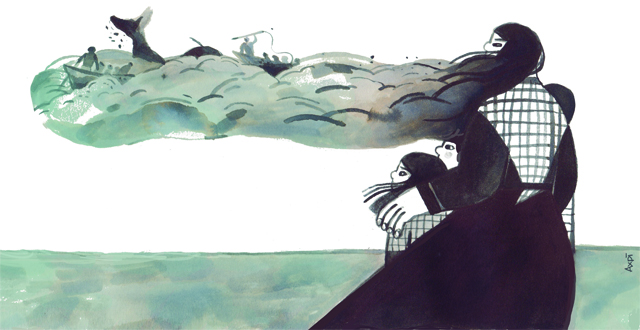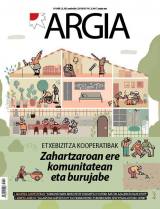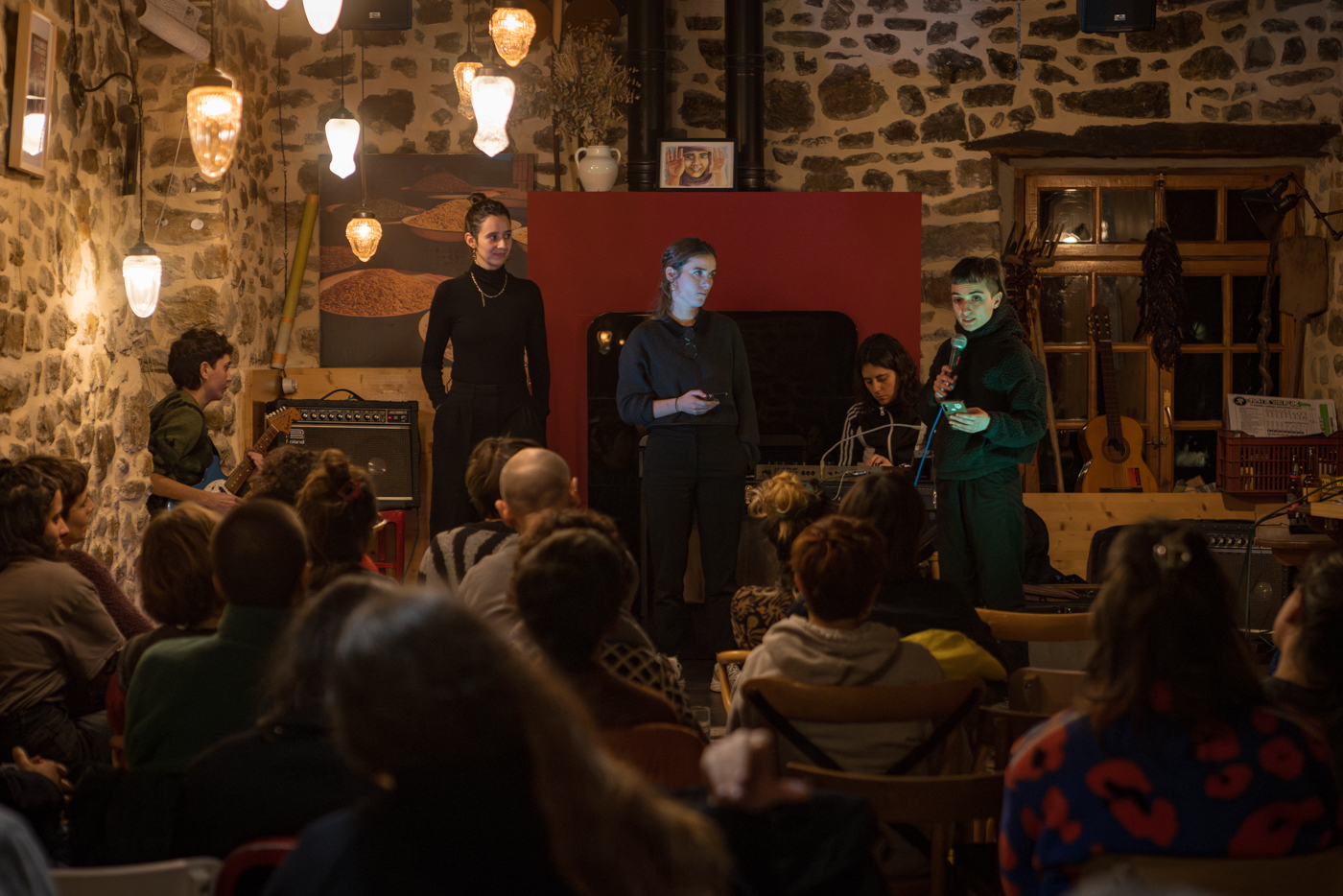Roll in furacanes
- Recently, Alberto Santana taught us in Euskal Telebista a history of Baskonia in a very nice section, in which the Basques were not very fond of the seas. Their ancestors had to learn how to survive between the waves and the grasslands. Since the 15th century, the Icelandic whalers, the youngest boys, the three captains hijackers and the cod fishermen of Newfoundland enriched our basket.

In the 19th century, the theorizers of nationalities established the roots of Basque culture in the world of grazing and fatigue, more than in the epic fisherman of the coast that stretches from Baiona to Muskiz. However, since the Basque Country was written, Joanes Etxeberri (1580-1665) of Ziburu dedicated his prayers to the detail of the lives of the seafarers, and in recent years the shining trajectory of Basque fishermen has been reinvestigated: Aurelia Arkotxa focused on the navigation book of Martin Doyarçabal, the Hinka group gave us the spectacular 1615, Iñaki Petxarroman wrote the novel Kearen fiordoa and American land friends of Maine and Xabier Agote picked up the film Elkarrekin-Together. They are just examples.
The march to Newfoundland is not heard many times out loud. The Karidadeko Benta group recorded a part and can be heard on the regular channels of the network. They are divided into three parts in the Xaho basket published by Susa in 2006: Sad party for Ternuarat, the perillas of the Sea and the sorrows of Ternua. In the Basque stand of Baiona is the original document with the number MS97. It was first published by Patri Urkizu in 1986.
In many of the works that have as axis the sea we can find the three damiselas of San Sebastian, the epic of the boat Saint Paul that departed from Bordeaux (1868), that Benito Lertxundi whispered to us the coplas of the last whale that was seen in Orio on May 14, 1901, the eresia of the fog of Baiona and the daughter of the Marquis who fell in love.
The testimony of the fishermen of Newfoundland was reclined on paper in 1789, as is known. Of the ports of Ziburu that were then called San Juan de Luz, Zokoa or Bahía La Concha, they built and departed ships for seven to eight months, after the cod or whales, loaded with young sailors and brave captains:The boat travels through
La
Concha to the entire company Han, heads to Newfoundland to
win something.
If
a strong wind
blows, it wins Zabala and goes back
to the sea. I can't see Larrun!
Although the author is unknown by his name, from the tone of the Basque Country, we can suspect that he is a labortan, a laboratory that usually goes to bed with water and waves in the shadow of Mount Larrun on this coast.
The ten fragments of Ternuarat tell us about the journey between Europe and North America. The fishermen were deeply aware that the family settled in the bank:
If you lose the
Father
Widow Mother The
broad sea
is noted from the words in a living poem. We feel the winds, the foams on the faces, the candles and the graznids of the strings to the extent of the heavy waves, and the furacan's fury reflects us the devil of the gates of hell:
All the sky
fell upon Babazuza and
Uri, the
seafarers torn by the cold.
…
Elementak badarontza
Itsasoak
habarrotsa, Haize tenpesta uxia is masked in the mar.El
bertsolari presents Ternuaratze as reaching an island of desolation in the part Dolores de Ternua as if it had been there and perhaps tells us the experiences of a former sailor. The brief verses shed anxiety in the story: the wings of the wind flatter the peaceful landscapes of the land of Euskal Herria.
Ternua is a cold desert Earth sad and strange Earth that is not cultivated Always snow in invierno.Los forests of large scrubs The meadows and mountains Hard rocks Arid and dry lands There wolves and bears The wild beasts of the forest The village of animals The great desierto.En foundthe language of the Indians of the Mik-Mak tribe
Newland
It is located at the mouth of the San Lorenzo River in Quebec, in the Labrador region. Together with the Bretons, the Basques had been exploring at least since the 15th century, in the middle of the summer, the fertile waters of Newfoundland. In addition to cod, whales were also hunted in the Bay of Biscay for systematic exploitation.
To the south of Labrador is Red Bay, center whale of the 16th century. Of course, in Newfoundland and the plains of the Labrador, European fishermen had contacted the people there. As in the West Fjords of Iceland, between 1580 and 1635, a kind of pidgin emerged between the Basques, the Macaques and the algonquin, such as the words "fatherland" (brother), "makia" (palo) or "aturrai" (shirt). But not every day could be:
In Newfoundland are the
savages and the
enemy waiters The
human beast is the cruel, the sailors eating dead.
Living in
barbaria Aging in
galeras It is no
longer a pity, let alone in Terranova.Para working
in the works of Newfoundland did not have to be weak, useless or imprisoned of diseases. Quite the opposite. They had everyday heaviness, and the poet insists on the toughness of the task:
I couldn't stay, that's
what's needed. Always on day,
always tomorrow,
every Monday, for holidays and Sundays.
…
There you don’t need
nausea, you don’t need to be lying
down,
there you get loose Alferra.
…
The
hell of
Ternua Marinel in the long summer Paradise in the Basque Country What a final review! As we have said, the prayers of the fishermen were not too tender: hard work, between oil and smoke aromas, adverse sea, humiliated under the commandments and in return too small a wage. Those of Ternua did not break the image:
Jobs and penalties
that don't end, because they
have a thousand
to do a job to get started.
There are no steps in the
day Not a step
in the night, in the Trabailuan
there is always a hurry Lana was irresistible.
The singer of the tragedies of the fishermen of Newfoundland wanted to mark the spirits of the listeners. In addition to his work, he repeated on more than one occasion that the perillas were many, and in a spectacular way, through these poems:
Sailors created short life
in old age,
mostly in
youth, in the world of Badoazi.
At home, when
damage can
be
done, then
the Mainada men are lost, the good
receptores.El
sailor has left
for Sekulakoz, Anitz finally goes to Finnup.
The fiery fisherman remembered the mainds or the children. In Bearn's language, the sheets are children. This can demonstrate that the sailings were not all from the coast, but also from the interior, as well as the livelihood they obtained as labourers and sailors. We know, on the other hand, that many seamen do not yet know how to swim. We can imagine fear and craving when the boat headed to the bottom:
The water descends the
pear, the water rises under the
Tila to the bottom of the Untzi.Los naked sailors Elongated or Vivaces, Swimming under the
waves Attached to the barcos.No there is salvation where the water does not have its place, nor
by where the air can join.
The
ventura of the
sailor, the burial
at sea, the pain back home with those of the Sekulaco.
The sailor's last thought, about to drown, flew, at the weirdest hour, to the house. Once a horrendous galtender had passed through, the boat, which could not die or be lost, reached the shore of Newfoundland.
Saving some boats Crossing
the Arribatu
Sea to Newfoundland To the ports that the
kindness requieran.La of these small four-verse zortzikos, rimated from two to two, brings us
a historical, rigorous and passionate testimony. The rhythm reminds us of the sounds and noises that perhaps marked the collective work of the sailors:
The Barquichuelo called, the Elephant jumped
from one side to the other,
and the bow slipped from
one side to the other to the Kostaduba Pier.
Fishing is already in the hands of industrial and multinational shipowners. We have a set of songs to remember the work of the meat-and-bone sailors, and perhaps not to forget the language of the sailors Euskal Exhibitors in 1982 The captain of the cargo ship Jacques Garat de Bidar comb the bilingual marine lexicon (Euskera-French). She confesses that she learned her trade with the remains of Ternua.
Martxoaren 17an hasi eta hila bukatu bitartean, Literatura Plazara jaialdia egingo da Oiartzunen. Hirugarren urtez antolatu du egitasmoa 1545 argitaletxeak, bigarrenez bi asteko formatuan. "Literaturak plaza hartzea nahi dugu, partekatzen dugun zaletasuna ageri-agerian... [+]
1984an ‘Bizitza Nola Badoan’ lehen poema liburua (Maiatz) argitaratu zuenetik hainbat poema-liburu, narrazio eta eleberri argitaratu ditu Itxaro Borda idazleak. 2024an argitaratu zuen azken lana, ‘Itzalen tektonika’ (SUSA), eta egunero zutabea idazten du... [+]
Joan Tartas (Sohüta, 1610 - date of unknown death) is not one of the most famous writers in the history of our letters and yet we discover good things in this “mendre piece” whose title, let us admit it from the beginning, is probably not the most commercial of the titles... [+]

















ilbeltza-(1).jpg)


